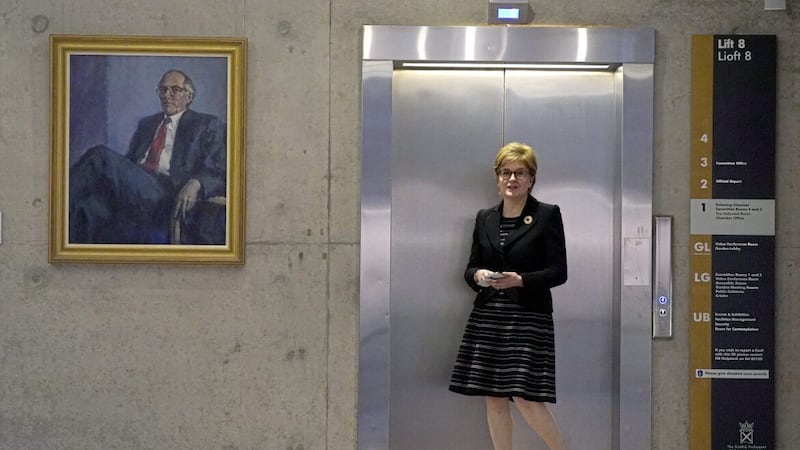THE fall of Nicola Sturgeon deserves a better response than unionist glee and nationalist denial, the default reactions so far across the UK and Ireland.
It raises a broad question of great relevance to Northern Ireland. Why has the SNP not made a success of devolution?
At first sight the party has everything going for it: a huge mandate at every level of government; more powers in a more coherent framework than any other devolved region; and plenty of money – public spending in Scotland is 17 per cent above the UK average.
The SNP has not been unafraid to use its extra powers, despite charges of populism and cowardice. It put income tax up, eventually, first on high earners then on most basic rate taxpayers.
While socially liberal, its economic instincts remain centre-right – the nickname ‘Tartan Tories’ still applies. Socially left and economically right is the magic combination in politics, a contradiction in theory that fits most people’s views in practice. It also allows the SNP to bestride the public and private sectors, a set of relationships most democratic parties can only envy.
Yet after 16 years in office under these near-ideal conditions, Scotland’s performance on most policy indicators is the same as the UK’s or worse. That includes key SNP targets on education, health and crime.
A common critique of the SNP is that it seeks difference from England for the sake of being different, causing it to make strategic and political mistakes.
This could partly explain the gender identification law that heralded Sturgeon’s demise. However, it is not much of a general explanation. The whole point of devolution is to facilitate different policy approaches within the UK. Most of the SNP’s objectives, such as higher literacy or lower drug abuse, involve no constitutional or even party political controversy.
So is the problem devolution itself? This is a fringe but prominent view among unionists in Scotland, although their concerns are more widely shared. Devolution, they say, is an expensive and unnecessary layer of administration in a highly-centralised modern state. It mainly serves to turn politics into a sterile unionist versus nationalist argument, crowding out all other priorities.
Even accepting these concerns as valid, devolution is unlikely to be significantly reversed, let alone abolished. If a serious movement develops to ‘de-constitutionalise’ devolution, it may take the form of Canadian-type laws specifying the exact process of breaking up the country. In Canada, this has thrown a bucket of cold water over the whole idea. In the UK, such laws would have to be restricted to Britain, as Northern Ireland’s exit mechanism has already been agreed.
The mainstream view on the failure of devolution echoes the old joke about socialism: it has never really been tried. Holyrood’s powers are in truth quite limited and incoherent by international standards. More devolution was Westminster’s standard response to the rise of the SNP and may remain the standard response to its decline.
The case for this was set out in Monday’s Times by Mark Littlewood, director of Conservative-linked think tank the Institute of Economic Affairs.
He wrote that with the constitutional threat abating, it is now safe to let the experimental potential of devolution off the leash. This should go beyond handing over more powers – the Scottish budget should be properly devolved. Under the current system, nearly all the tax revenue raised in Scotland is sent to the Treasury. Separately, the Treasury sends Holyrood nearly all the money it needs as a block grant. Breaking the connection between tax and spending discourages joined-up policies, infantilises Scottish politics and dumps all the costs of failure on the UK taxpayer overall.
Reforming this system would mean recasting the UK’s entire devolution settlement.
Littlewood thinks this could create a stable condition where nationalists feel sufficiently independent from Westminster and politics in Scotland refocuses on what we in Northern Ireland adorably call ‘real issues’.
That is a unionist hope. There are also figures in Scottish nationalism proposing maximum devolution as a long-term arrangement, from which to make more gradual progress towards independence. Devolving budgets and ending the Barnett formula would have crucial appeal in England, where people are tired of feeling they get all the bills and all the blame.
Full fiscal devolution is Sinn Féin policy. The DUP is suspicious of this as a nationalist agenda but it supports devolving individual taxes and wants the Barnett formula replaced. Northern Ireland needs to be in the coming debate. But without Stormont, we are merely a spectator.








